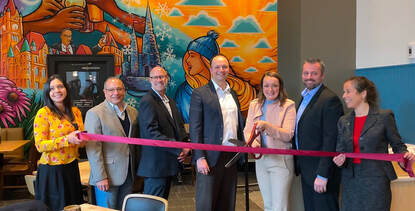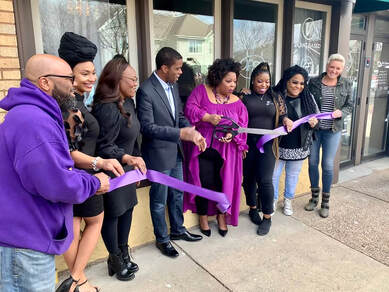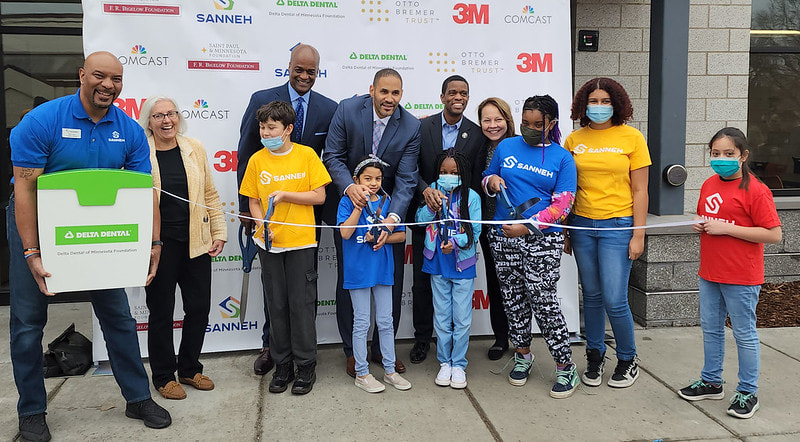|
Last October Todd Axtell announced his decision to step down from his position as Police Chief of the City of St. Paul. This past Thursday, almost 200 people gathered to give Chief Axtell a fantastic send-off (most assuredly just one of many), marking the conclusion of his 33-year career. Saying goodbye to the Chief, wishing him well in future endeavors, was bittersweet. Ever an inclusive, people-first leader, Chief Axtell embodies the essence of our well-respected police force: “trusted service with respect.” He will be missed. The event was at times funny, touching, poignant. He was honored by friends and colleagues, thanked most sincerely by the Minnesota Wild owner Craig Leipold, teased playfully by former Mayor Chris Coleman. He was congratulated by former Chiefs Harrington and Smith, and retired City Councilmembers and police officers Debbie Montgomery and Dan Bostrom, the latter who was Axtell’s boss many years ago on the force. When it was his turn to speak, even then – on a day celebrating him - Axtell turned his comments towards the police department members, both sworn and unsworn, thanking them for their dedication. Back in October Axtell offered thoughts on his departure, and they echoed for me on Thursday. He said, “I’ve learned from those I admire that when you possess the heart of a public servant, you never stop trying to make a positive difference in the lives of your neighbors.” Indeed. Since he took the helm in 2016, Axtell ushered in changes and lived by his commitment for ever-increased transparency and accountability. He encouraged historic levels of community engagement, and was committed to diversifying the department and embracing innovative ideas that can help people stay out of the criminal justice system. Some key examples include: under Axtell’s leadership, the SPPD initiated the expansion of its training program to include crisis intervention training for all officers, Ethical Policing Is Courageous (EPIC) training, moral courage training, de-escalation and disengagement training, and use of force training that emphasizes reductions in injuries to subjects and officers. The SPPD also established the Law Enforcement Career Path Academy (LECPA), focused on recruiting diverse adults between the ages of 18-24 who reside in Saint Paul and come from a low-income family or who face a barrier to employment. The 2019 SPPD Academy class included the first LECPA graduates, helping to make it the most diverse class in the history of the department—30 of the 39 graduates were women and/or BIPOC. This has helped diversify the SPPD ranks; at the end of 2020, 28 percent of officers were BIPOC, compared to 18 percent just four years earlier. In addition, in March of 2021, Chief Axtell signed the 30x30 pledge, to work towards increasing the number of female recruits at SPPD to 30 percent by 2030. Another example of innovation can be found in the SPPD’s Community Outreach and Stabilization Unit (COAST), which is a program based on two nationally recognized police mental health collaborative best practices—a co-responder program and a case management program. The unit, which was originally launched in 2016 to focus on mental health calls, has expanded over the past couple years to include a chemical dependency program and a homeless/un-sheltered outreach program. It is a shining example of what can be accomplished when communities, social service providers and police departments work together to address emerging issues in innovative ways. These changes and many others have helped to make the Saint Paul Police Department a model for excellence in policing. Axtell wrote to the department’s officers last October that they’ve “taken what those who came before us built and made it stronger. You’ve watched over St. Paul through unprecedented unrest,” he wrote to them. “You’ve responded to human tragedies that our community has never before experienced. You’ve worked longer hours with fewer colleagues and never stopped being there for the people in the throes of life’s worst moments. And you’ve done it all under glaring and often harsh scrutiny. I’m so incredibly proud of all of you.” The same can be said about you, Todd. We are better for your service, and are deeply grateful for your commitment to service and to our city. On a side note: St. Paul has named a police chief selection committee. I applied and was accepted on the committee. Meetings will begin in late May/early June. I’ll keep you all posted on the progress. See you in the trenches. B
Federal:
State:
Regional
Read more updates in our weekly Chamber Advocacy Update
0 Comments
We are so excited to celebrate ribbon-cuttings with our fabulous members that we’re taking over B’s Blog again to highlight our newest and growing St. Paul area businesses! Today we highlight Lip Esteem, the small bricks and mortar lipstick start-up; our growing non-profit partner The Sanneh Foundation; and Momento, the latest addition to the family-owned Morrissey Hospitality companies. These businesses represent so much of what makes our business community remarkable -- innovation, empowerment, and connections that count in action. We love it!
If your member business is looking to expand or reopen and wants us to help celebrate your business with a ribbon-cutting, tell us more!
B's blog, It's Our Business, will be back next week with more thoughts and a quick read on things you should know. See you in the trenches. Your St. Paul Area Chamber Team Like many of you, I’ve been out and about more regularly. The Chamber office is officially “open,” as are most of yours. And I’ve been talking with you. I’m hearing from a lot of people that you’re really feeling overwhelmed. A few of you are out on R&R these last couple of weeks, because you really needed the break. I’m saying this out loud in case others are feeling this as well, without the reassuring knowledge that yours is a common experience right now. This past week one of our members shared the perfect phrase to describe what we’re experiencing: “it’s been a series of ‘black swan events,’ and we’re all tired.” That phrase was new to me. So I had to look it up: Investopedia tells me that “A black swan is an unpredictable event that is beyond what is normally expected of a situation and that has potentially severe consequences. Such events are characterized by their extreme rarity, severe impact, and the widespread insistence – in hindsight - that they were obvious.” Think about it…. The pandemic, George Floyd murdered, civil unrest, attack on our nation’s capital, oh-yes-the-pandemic-round-2, crime, rent control, inflation, and now war in Ukraine. We keep going to survival mode. If you remember, last year I talked about the “surge capacity, and why we feel awful.” It bears repeating. At some point we run out of that surge capacity, and I’m sensing that here. Among all of us, myself included. When we reach the limits of our surge capacity, when it’s depleted, it has to be renewed. Especially hard because the significant string of black swan events, one after the other, has changed our “emergency” phase to “chronic.” And that’s when I heard encouragement from this member, because he reminded me about the value of chambers: we bring people together for nurturing togetherness. We actually do “create connections that count.” These moments together can help us renew, recharge, refresh. So if you, too, have run out of gas, so to speak, come see us. Come see one another. We’ve missed you, and need you too. See you in the trenches. B
Federal:
State:
Regional
Read more updates in our weekly Chamber Advocacy Update.
Thanks for your indulgence while I was away last week. Where was I, you ask? I joined a group of about 50 others on an inaugural “Reckoning for Truth, Trust, & Racial Justice Tour,” hosted by the Center for Economic Inclusion. I met colleagues – and made new friends - from our region and from across the country. Lissa Jones-Lofgren was our “translator,” and she set the tone by reminding all of us that: “if you’re Black, today is either the day before or the day after something went down.” Together we walked through the streets of Montgomery, AL, toured the Legacy Museum, and the Rosa Parks Museum. We walked the path of enslaved people, from the water’s edge to the warehouses and the slave depots. We saw the “Black streets” and the “White streets” downtown. We walked through the National Memorial for Peace and Justice. We crossed the Edmund Pettus Bridge in Selma, learning the history of Bloody Sunday, March 7, 1965, and the successful march of March 21, 1965, that culminated with 25K people on the steps of Montgomery, AL capitol building. These marches became a turning point in the Civil Rights Movement. As you might imagine, so many thoughts about this transformative trip. Powerful, haunting, uncomfortable. I’ll share an excerpt from Martin Luther King Jr’s “How Long, Not Long” speech, spoken on those capitol steps, on March 21, 1965: Once more the method of nonviolent resistance was unsheathed from its scabbard, and once again an entire community was mobilized to confront the adversary. And again the brutality of a dying order shrieks across the land. Yet, Selma, Alabama became a shining moment in the conscience of man. If the worst in American life lurked in its dark streets, the best of American instincts arose passionately from across the nation to overcome it. There never was a moment in American history more honorable and more inspiring than the pilgrimage of clergymen and laymen of every race and faith pouring into Selma to face danger at the side of its embattled negroes…. I know you are asking today, “How long will it take?” Somebody’s asking, “how long will prejudice blind the visions of men, darken their understanding, and drive right-eyed wisdom from her sacred throne?” …. I come to say to you this afternoon, however difficult the moment, however frustrating the hour, it will not be long, because “truth crushed to earth will rise again.” - Martin Luther King Jr, March 21, 1966. May we all feel the conviction of his later words: It may well be that we will have to repent in this generation, not merely for the vitriolic words and the violent actions of the bad people who would bomb a church in Birmingham, Alabama, but for the appalling silence and indifference of the good people who sit around and say, ‘wait on time.’” – Martin Luther King Jr, 1966 Convocation. Together we can walk in the footsteps of change. See you in the trenches. B
Federal:
Regional
Read more updates in our weekly Chamber Advocacy Update
|
Archives
July 2024
|
|
Address:
401 Robert St. N., Suite 150 St. Paul, MN 55101 |
Office Lobby Hours:
Monday: Closed Tuesday: 9AM–4PM Wednesday: 9AM–4PM Thursday: 9AM–4PM Friday: Closed |
Get weekly news on local businesses, events, offerings and more.
|
|
Board Member Login
|
©2022 St. Paul Area Chamber. All Rights Reserved.
|

















